Horse Packing in Yellowstone Park
Our guide saw it first: a hunk of silvery hair caught in the bark of the tall spruce where our food, toiletries, and everything else with a fragrance that might attract a bear had been hung the night before. Ten feet up, and far enough from the trunk that a black bear couldn’t reach it. Black bears climb trees; grizzlies don’t, except very young ones. But this wasn’t black bear hair. “Griz,” he said calmly, passing the coarse hair around the group. We gazed up at our gear, large bright orange boxes filled with food and our toiletries bags, the wranglers’ clothing that smelled of steak and cook stove oil, and assorted supplies. We shivered a little and exchanged nervous glances, knowing a grizzly bear had prowled through our campsite while we slept. We were grateful that our wranglers followed Park rules and had us pitch our tents a hundred yards from that tree.

We were on a horse pack trip in Yellowstone National Park, in a primitive, leave-no-trace backcountry campsite miles from the nearest trailhead. For six days and five nights the men and women on this journey would be riding through some of the most beautiful, pristine mountains, forests, and meadows imaginable. We chose to zip ourselves into sleeping bags on the ground instead of snuggling into our familiar beds, to clamber over small streams and logs and through wet grass, to squat over a toilet seat placed carefully on a freshly dug hole, and to gather our personal items and watch them disappear high up into a tree morning and night. We had deliberately left the comforts of home behind to immerse ourselves in the vast and unique Yellowstone Park wilderness. And on horseback! Even though some of the group had little riding experience, or had enjoyed lessons as children many years ago and not ridden since, we shared a deep love of horses — their power and beauty, their scent, the feeling of moving in rhythm with their gaits.
We met our guides, Jake and Cliff, at the Specimen Creek Trailhead, in the northwest corner of the Park, where each person was assigned a horse matched to his or her level of riding skill and experience. The wranglers carefully balanced large loads on the pack mules, secured them with mysterious knots, and led us single file down the beckoning trail. Our plan was to spend three nights at Sportsman Lake, then ride up and over Electric Pass to Gardner’s Hole, where we would camp two nights before packing out at the Glen Creek Trailhead.

Ordinary concerns fell away as each day we basked in the wild beauty of the Park and the almost meditative experience of being in the saddle for several hours a day. Mostly we walked or trotted; but after a couple of days, when Jake signaled and yelled, “Yee Haw!” we let loose and cantered along flat trails through long meadows. Such a sense of freedom and exhilaration!
As the hours passed, our senses awakened: we listened eagerly for the skree of red-tailed hawks and were awed by a magnificent Bald Eagle soaring overhead. We caught whiffs of muskrat along streams, the perfume of wildflowers, and the dizzying scent of sage in the meadows.
While we rode, our eyes searched the hills and forests for a glimpse of a moose, a coyote, a bear. On one ride Cliff stopped, pointed to a nearby hillside, and put a finger to his lips. There stood a large cow moose with a small, ungainly calf, still as statues. They stared at us, and we at them, until they broke and trotted awkwardly away, disappearing into the forest.
Jake and Cliff fed and kept a careful eye on the horses and pack mules and cooked surprisingly delicious meals. They were fun, too. At night we sat around the campfire on logs, telling tales, singing familiar western songs. They took time to share their maps with us, too. And though we knew where we were headed each day, we couldn’t have anticipated the adventures that were in store.

One day we left our campsite in bright morning sunshine for a two-hour ride to a small lake, where we planned to enjoy our sandwiches and a refreshing swim. We rode through acres of standing dead trees that had burned in the fires of 1988. The trail was clear, the tall gray trees quiet and ghostly. The lake was lovely, clear and cool, but Jake pointed to dark clouds roiling overhead.
“Gotta head back, now”, he said urgently. “That storm’s comin’ fast.”
Sure enough, we barely had time to don our rain gear, mount our horses, and head back up the trail before a severe thunderstorm hit us with drenching rain, thunder and lightning, and the sound of dead trees falling. There was no shelter so we kept moving. A tree crashed across the trail a couple of hundred yards ahead of us, blocking our way. There was no way around it.
No problem. The wranglers tied their horses, unpacked two saws, and quickly sawed through the thick tree, dragging enough of it out of the way that we could ride through.
The storm passed by in no more than 20 minutes, but it felt like forever. As we rode closer to camp, we were amazed to see large white hailstones the size of golf balls carpeting the forest floor. Cliff swore under his breath when he saw that the hailstorm had flattened the cook tent and scattered pots and pans across the meadow. Our sleeping tents sagged with hail, but none had collapsed. We unsaddled our wet horses, hung the tack and rain gear, then turned the horses out into the meadow, and helped the guides clean up. That night we huddled close to the blazing campfire for a long time.

The next day would be the long, challenging ride over Electric Pass! But at dawn when we looked up at Electric Mountain, we were alarmed to see two fires burning on the mountainside, apparently sparked by lightning from yesterday’s storm. Jake galloped up the trail until he was high enough to call a ranger and report the fires. When he returned, he was shaking his head.
“Can’t take a chance,” he said apologetically. “There’s a free campsite a morning’s ride from here instead. Stay there a coupla nights and go back the way we came in. Shucks and darn.”
We were disappointed not to be able to ride over that high mountain pass, but soon we had a chance for a rare wildlife encounter. A ranger rode by our camp and told us that wolves had taken down an elk nearby and were feasting on it. Though some of the group were fearful of encountering the wolves, three of us rode out silently just before dawn the next day and found the elk kill in the river, with five wolves feeding on it. The wolves scattered into the timber. We let out our breath and looked at each other, astonished that we had been close enough to see their intense green eyes and rippling fur.

One day Betsy, a woman from New York City with little wilderness experience, plunged impulsively into a creek to cool off. She dove into the clear water, surfaced, and came face to face with a large beaver! The beaver slapped its tail and fled underwater; Betsy scrambled out of the water, shrieking, and ran for camp. The rest of us laughed so hard we nearly cried.
Too soon we had to head back to the trailhead, tired and happy. Had we missed our cell phones, TV, and all the news that’s fit to print? Not one of us.
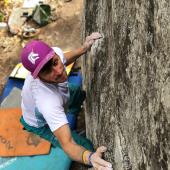
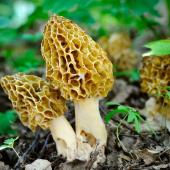
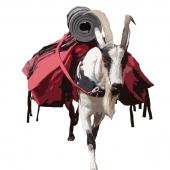
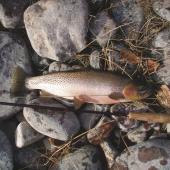


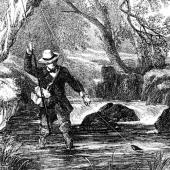
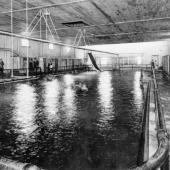
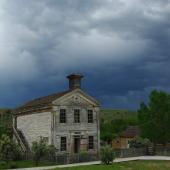
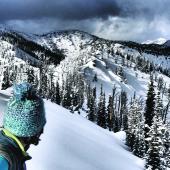
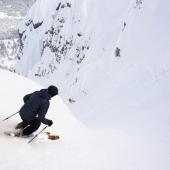

Leave a Comment Here